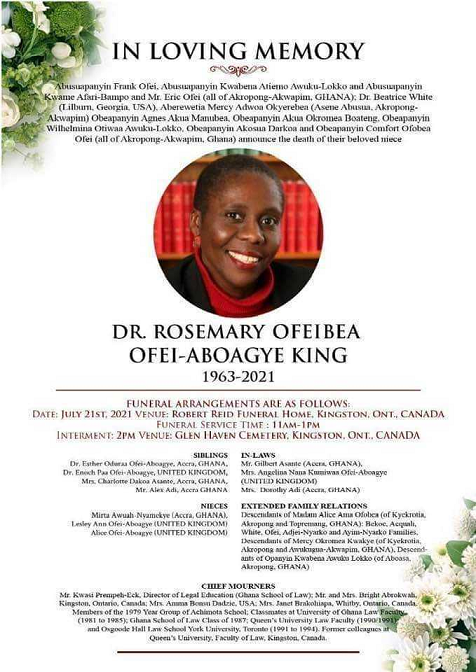
By Mark Walters, Dean, Queen’s Faculty of Law
Queen’s Law is celebrating the memory of one of its most cherished and beloved members, a pioneer of education equity, a scholar of gender equality, and a great builder of the Queen’s law school community, Rosemary Ofei-Aboagye King. Rosemary passed away on July 6, 2021 at the age of 57. A virtual memorial service and celebration of life is taking place at 11:00 a.m. ET on July 21, 2021.
Rosemary is remembered by her loving family and friends, as well as countless students and colleagues from the Faculty of Law, whose lives she enriched through her generous character, boundless enthusiasm for teaching and student excellence, meaningful contributions to critical legal scholarship, and, of course, her incisive wit and sharp sense of humour.
She was a transformative figure both at Queen’s Law as well as in the broader legal academic community. Rosemary completed her first degree in law at the University of Ghana and arrived at Queen’s in 1990 to conduct her graduate work. Her LL.M. thesis was entitled “Addressing Domestic Violence in Ghana”. Rosemary developed this ground-breaking legal scholarship further during her doctoral studies at Osgoode Hall Law School. Her doctoral thesis, entitled “Ghanaian Women: Equality & Empowerment”, was completed in 1994.
Rosemary was admired for her legal scholarship – for her ability to approach deep social problems through a lens that combined critical and feminist theory with a comparative approach that saw links between countries and legal traditions. Her work appeared in such academic publications as the Journal of Women in Culture and Society, the Columbia Journal of Gender and Law, and the Human Rights Review.
During her years as a doctoral student, Rosemary remained very much part of the Queen’s legal community, first as a Scholar-in-Residence and then as an Assistant Professor in the Faculty. In 1992, Rosemary was appointed as the first Director of Educational Equity – a position that was entirely unique in law schools in Canada at the time. She would hold this position for over 10 years, developing an approach to equity and student support that was innovative and continues to shape the law school community.
As a teacher, Rosemary was creative and challenged norms of the time, combining an informal teaching style designed to encourage engagement, while ensuring rigorous analytical discourse to get the very best from her students. Rosemary was especially welcoming to international graduate students. Indeed, a number of Ghanaian students followed her to Queen’s to study, including the first Queen’s Ph.D. student in Law, Peter Atupare (Ph.D Law’11), as well as Charlotte Osei Kesson-Smith (LLM’95), who would become the head of the Electoral Commission of Ghana.
Whether through her dedication to academic guidance and support, ardent pursuit of equity within legal education, or her passion for helping others succeed, Rosemary provided an inspiring example of what a colleague should be within an academic community. Her smile, her laughter, and her generous spirit were infectious and helped to define the atmosphere of work and learning amongst this school. All who knew Rosemary, would agree that her contributions to the Queen’s Faculty of Law were truly significant. While she will be greatly missed, her legacy and contributions to this institution will live on for generations.
Read our tribute article that celebrates Rosemary King's life and work and includes comments from faculty and alumni: Remembering school's education equity pioneer.